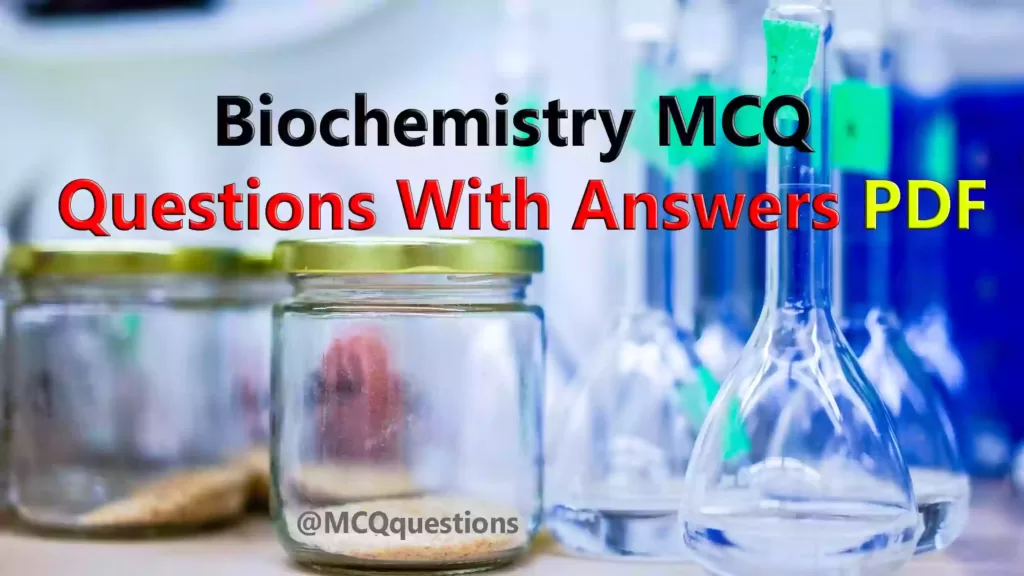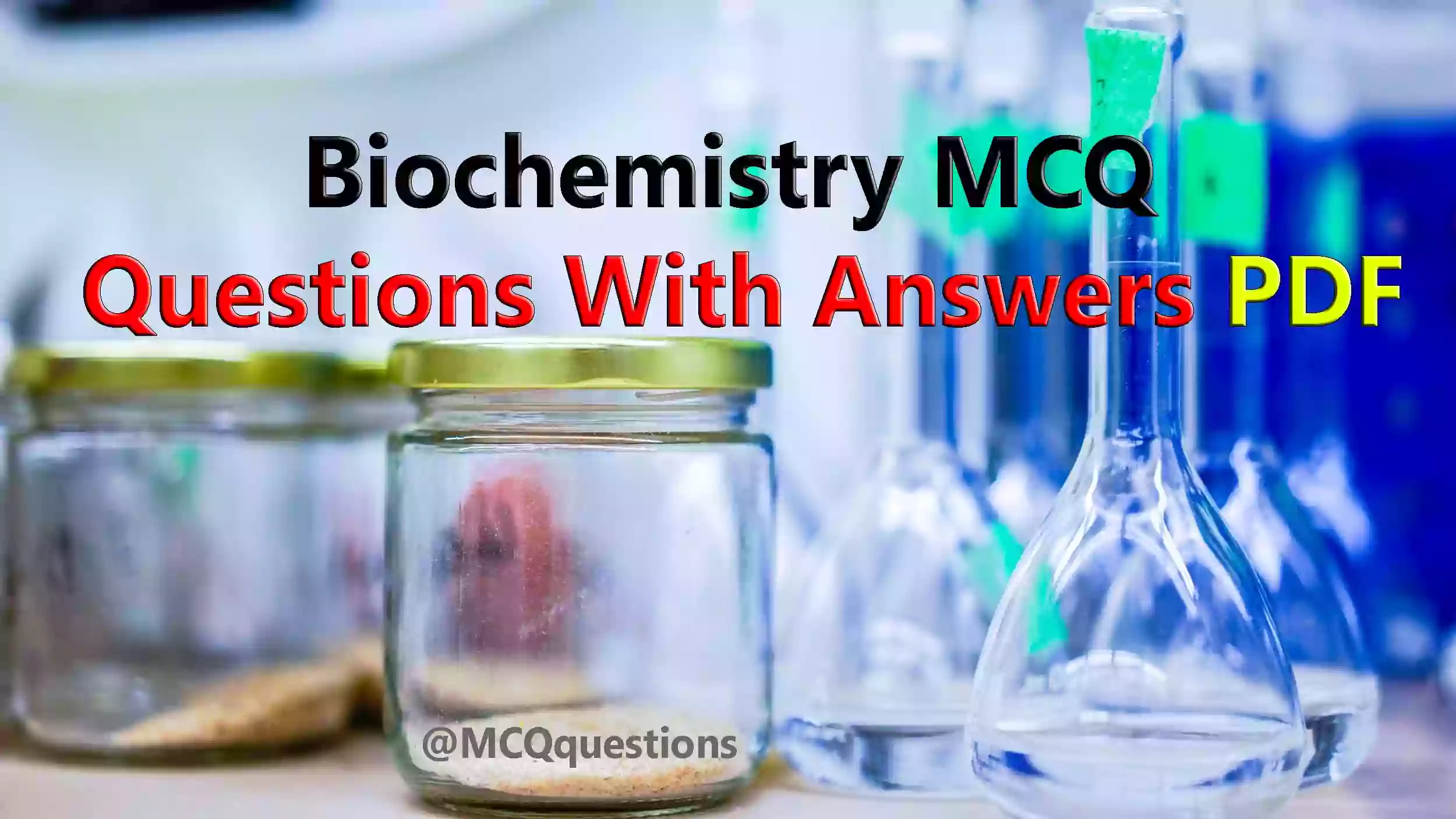Biochemistry MCQs on Nucleic Acids
Biochemistry MCQ Questions With Answers PDF – 1

Biochemistry MCQ Questions With Answers PDF
Also Read Biology MCQ
1. Nucleic acids combine with which biomolecule?
(a) Fats
(b) Lipids
(c) Carbohydrates
(d) Proteins
Answer (d) Proteins
2. Nucleotides are linked together to form nucleic acid through
(a) Glycosidic bond
(b) Phosphor-di-ester bond
(c) Both
(d) None
Answer (b) Phosphor-di-ester bond
3. nucleotides have how many components?
(a) 2
(b) 3
(c) 4
(d) 5
Answer (c) 4
4. The compound does not contain the phosphate group, is
(a) Nucleotide
(b) Nucleoside
(c) Both
(d) None
Answer (b) Nucleoside
5. Which of the following is purine nucleotide?
(a) Adenine
(b) Uracil
(c) Thymine
(d) All of the above
Answer (a) Adenine
6. Which of the following is pyrimidine nucleotide?
(a) Uracil
(b) Cytosine
(c) Thymine
(d) All of the above
Answer (d) All of the above
7. RNA doesn’t have
(a) Uracil
(b) adenine
(c) Thymine
(d) guanine
Answer (c) Thymine
8.Where is RNA present?
(a) Mitochondria
(b) Nucleolus
(c) Cytoplasm
(d) Both B and C
Answer (d) Both B and C
9. Phosphate group is attached to which carbon of pentose sugar
(a) C-1
(b) C-2
(c) C-4
(d) C-5
Answer (d) C-5
10. What is the full form of AMP?
(a) Adenine mini-phosphate
(b) Aldehyde mono-phosphate
(c) Alcohol mono-phosphate
(d) None of the above
Answer (d) None of the above
11.Which of the following protein is the component of nucleoprotein?
(a) Proline
(b) Arginine
(c) Histones
(d) All of the above
Answer (c) Histones
12.Number of hydrogen bonds between adenine and thymine?
(a) 1
(b) 2
(c) 3
(d) 4
Answer (b) 2
13.Number of hydrogen bonds between guanine and cytosine?
(a) 1
(b) 2
(c) 3
(d) 4
Answer (c) 3
14.Which ratio is constant for DNA?
(a) A + G / T + C
(b) A + T / G + C
(c) A + C / U + G
(d) A + U / G + C
Answer (a) A + G / T + C
15.The disruption of nucleosomal structure is due to
(a) Acetylation
(b) Carboxylation
(c) Phosphorylation
(d) Methylation
Answer (d) Methylation
16.Left handed helix contained nucleic acid is
(a) M-RNA
(b) T-RNA
(c) A-DNA
(d) Z-DNA
Answer (d) Z-DNA
17. A phosphodiester bond is present in
(a) Nucleic acids in a nucleotide
(b) Monosaccharides in a polysaccharide
(c) Amino acids in a polypeptide
(d) Fatty acids in a diglyceride
Answer (a) Nucleic acids in a nucleotide
18. Uridine present in RNA is
(a) Nucleotides
(b) Pyrimidine
(c) Purine
(d) Nucleoside
Answer (d) Nucleoside
19. Nucleic acids are a polymer of nucleotide monomeric units. Each nucleotide consists of
(a) base-sugar-OH
(b) sugar-phosphate
(c) base-sugar-phosphate
(d) (base-sugar-phosphate)x
Answer (c) base-sugar-phosphate
20.No.of nucleotide found in DNA segment if it contains 100 Adenine and 100 cytosines,
(a) 100
(b) 200
(c) 400
(d) 50
Answer (c) 400
21. Nucleoside contains
(a) base-sugar
(b) base-phosphate
(c) base-sugar-phosphate
(d) sugar-phosphate
Answer (a) base-sugar
22. ATP is a
(a) Nucleoside
(b) Nucleotide
(c) Vitamin
(d) Nucleic acid
Answer (b) Nucleotide
Biochemistry MCQs on Proteins
Biochemistry MCQ Questions With Answers PDF – 2
1. One gram of protein contains
(a) 4.3 kcal
(b) 4.2 kcal
(c) 5.2 kcal
(d) 5.4 kcal
Answer (b) 4.2 kcal
2. The first class of proteins are
(a) Animal proteins
(b) Plant proteins
(c) Both
(d) None
Answer (a) Animal proteins
3. Proteins occur naturally in how many forms?
(a) 25
(b) 20
(c) 21
(d) 15
Answer (b) 20
4. Peptide bond formed by the enzymes is
Known as
(a) Carbonic anhydrase
(b) Peptidase
(c) Carbohydrate
(d) Peptidyl transferase
Answer (d) Peptidyl transferase
5. The proteins are synthesized at
(a) Centrosomes
(b) Ribosomes
(c) Golgi bodies
(d) Mitochondria
Answer (b) Ribosomes
6. Most abundant Protein is found in
(a) Cytoplasm
(b) Liver
(c) Mitochondria
(d) Brain
Answer (a) Cytoplasm
7. Which proteins are called messenger protein?
(a) Enzymes
(b) Hormones
(c) Storage
(d) Antibodies
Answer (b) Hormones
8. Proteins thqt helps in increasing the rate of chemical reaction in the body
(a) Enzymes
(b) Antibody
(c) Structural proteins
(d) Transport proteins
Answer (a) Enzymes
9. Example of a digestive enzyme
(a) Lactase
(b) Pepsin
(c) Keratin
(d) Collagen
Answer (b) Pepsin
10. In milk which enzymes break down sugar lactose
(a) Keratin
(b) Collagen
(c) Lactase
(d) None of these
Answer (c) Lactase
11. The protein helps to protect from any diseases in the body
(a) Antibodies
(b) Enzymes
(c) Storage proteins
(d) Transport proteins
Answer (a) Antibodies
12. Which proteins are called transport proteins?
(a) Ovalbumin
(b) Hemoglobin
(c) Keratin
(d) Enzymes
Answer (b) Hemoglobin
13. The protein that stores the iron in the transport protein is
(a) Ferritin
(b) Keratins
(c) Elastin
(d) None of these
Answer (a) Ferritin
14. Which protein is found in egg whites?
(a) Collagens
(b) Casein
(c) Ovalbumin
(d) Oxytocin
Answer (c) Ovalbumin
15. Proteins are synthesized in the body through
(a) Translation
(b) Transcription
(c) Both
(d) None of these
Answer (a) Translation
16. Translation occurs in the
(a) Cytoplasm
(b) Mitochondria
(c) Ribosomes
(d) nucleus
Answer (a) Cytoplasm
17. Enzymes are
(a) Proteins
(b) Carbohydrates
(c) Nucleic acids
(d) DNA molecules
Answer (a) Proteins
18. Amino acids are
(a) Building blocks of carbohydrates
(b) Building blocks of DNA
(c) Building blocks of lipids
(d) Building blocks of proteins
Answer (d) Building blocks of proteins
19. The simplest amino acid is
(a) Proline
(b) Methionine
(c) Glycine
(d) Serine
Answer (c) Glycine
20. The numbers of amino acid synthesized in our body
(a) 20
(b) 30
(c) 40
(d) 10
Answer (d) 10
21. The result of extreme lack of proteins is
(a Malaria
(b) Typhoid
(c) Kwashiorkor
(d) None of these
Answer (c) Kwashiorkor
22. In hair the protein found is
(a) Elastin
(b) Myosin
(c) Keratin
(d) Tropocollage
Answer (c) Keratin
23. Proteins are soluble in
(a) Benzene
(b) Anhydrous acetone
(c) Aqueous alcohol
(d) Anhydrous alcohol
Answer (c) Aqueous alcohol
24. The milk of the cow, contain which protein
(a) Albumin
(b) Vitelline
(c) Livetin
(d) Casein
Answer (d) Casein
25. Which is not a food nutrient?
(a) Carbohydrates
(b) Vitamins
(c) Proteins
(d) Enzymes
Answer (d) Enzymes

Most informative Sir